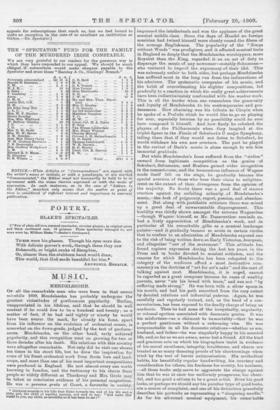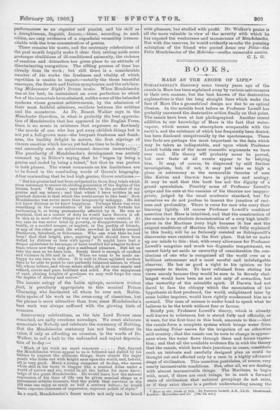M USI C.
MENDELSSOHN.
Or all the remarkable men who were born in that anus nlirabilis 1809, Mendelssohn has probably undergone the greatest vicissitudes of posthumous popularity. Berlioz, unappreciated in his lifetime, said that he should be well content if he could live to be a hundred and twenty ; as a matter of fact, if he bad said eighty or ninety he would have been nearer the mark, for already his fame, apart from his influence on the evolution of orchestral music, is somewhat on the down-grade, judged by the test of perform- ances. Mendelssohn, on the other hand, early achieved popularity, and this recognition went on growing for two or three decades after his death. His relations with this country wore altogether remarkable. Not only did he visit our shores ten times in his short life, but he drew the inspiration for some of his finest orchestral work from Scots lore and land- scape, and more than one of his most important compositions were produced in England. He met almost every one worth knowing in London, and the testimony to his charm from people so widely different as Thackeray and Mrs. Grote may be taken as conclusive evidence of his personal magnetism. He was a persona grata at Court, a favourite in society, • Gilchrist records in his Lifo that Blake towards the end of his life met a little girl, the child of wealthy parents, and said to her "God make this world to you, my child, as beautiful as it has been to me I" impressed the intellectuals and won the applause of the great musical middle class. Since the days of Handel no foreign musician had twined himself moro closely round the fibres of the average Englishman. The popularity of the " Songs without Words " was prodigious, and it affected musical taste in England so deeply that the Mendelssohn worshippers, more Royalist than the King, regarded it as an act of duty to disparage the music of any newcomer—notably Schumann— who ventured to imperil the supremacy of their idol. This was extremely unfair to both sides, but perhaps Mendelssohn has suffered most in the long run from the indiscretions of his admirers. The systematic overpraise of his music, and the habit of overestimating his slighter compositions, led gradually to a reaction in which his really great achievements have been indiscriminately confounded with his weaker work. This is all the harder when one remembers the generosity and loyalty of Mendelssohn to his contemporaries and pre- decessors. How charming was his tribute to Chopin when he spoke of a Prelude which he would like to go on playing for ever, especially because by no possibility could ho over have composed it himself. And how finely he rebuked the players at the Philharmonic when they laughed at the triplet figure in the Finale of Schubert's 0 major Symphony, telling them that if they would not listen to Schubert, he would withdraw his own now overture. The part ho played in the revival of Bach's music is alone enough to win him immortal gratitude.
But while Mendelssohn's fame suffered from the "sixties" onward from legitimate competition 118 the genius of Schubert, Schumann, and Brahma gained wider recognition in the concert-room, and the tremendous influence of Wagner made itself felt on the stage, he gradually became the special aversion of those who base their claim to enlighten- ment on the extent of their divergence from the opinion of the majority. No doubt there was a good deal of sincere reaction against the unfailing urbanity of Mendelssohn's music,—the lack of poignancy, regret, passion, and abandon- ment. But along with justifiable criticism there was mixed up a great deal of unwarrantable disparagement. This hostility was chiefly shown amongst the extreme Wagnerites —though Wagner himself, as Mr. Dannreuther reminds us, had a lively appreciation of Mendelssohn's work, and in particular of his remarkable gifts as a musical landscape painter—and it gradually became so acute in certain circles that to confess to an admiration of Mendelssohn exposed one to the risk of being written down as Early Victorian, bourgeois, and altogether "out of the movement." This attitude has found copious expression during the last ten years in the Press and in books devoted to musical criticism, and the reasons for which Mendelssohn has been relegated to the category of the mediocre afford a most instructive com- mentary on the doctrine of "art for art's sake" and the cant of talking against cant, Mendelssohn, it is urged, cannot be regarded as a great composer because he came of wealthy parents, never "ate his bread with tears," and was not " by suffering made strong." He was born with a silver spoon iu his mouth, and had his path smoothed from the very outset by devoted relations and influential patrons. Again, be was carefully and regularly trained, and, as the head of a con- servatorium, has been exposed to the deadly charge of being an academic. Then he had none of the irregularity, angularity, or colossal egotism associated with daemonic genius. It was his misfortune—as a claimant to immortality—that he was a perfect gentleman without a redeeming vice. He was irreproachable in all his domestic relations—whether as son, husband, and father—he was singularly happy in his married life, and, so far as we are aware, never lost a friend. All the kind and gracious acts on which his biographers insist in evidence of his moral excellence, integrity, lovableness, and charm are treated as so many damning proofs of his shortcomings when tried by the test of heroic antinomianism. His methodical habits, his beautifully regular handwriting, his courtesy and consideration for others, his fondness for society, his neatness, —all these traits only serve to aggravate the charge against him that he was at once too uniformly prosperous, too cheer- ful, and too good a citizen to be a groat artist, Even his good looks, or perhaps we should say his peculiar type of good looks, are a source of complaint, and one of his detractors gracefully describes his portraits as representing a " simpering noodle." As for his all-round musical equipment, his remarkable
performances as an organist and pianist, and his skill as is draughtsman, linguiat, dancer,—these, according, to such , critics, aro.only evidences of a superficial versatility irrecon, cilable with the true concentration of genius.
There remains his music, and the centenary celebrations of the past month happily make it clear that, setting aside some grotesque ebullitions of ill-conditioned animosity, the violence of reaction and detraction has given place to an attitude of discriminating recognition. The sifting process of time has already done its work ; but still there is a considerable number of his works the freshness and vitality of which repetition is unable to impair,—notably the three beautiful
seascapes, the Scotch and Italian symphonies, and the exhilara- ting Midsummer Night's Dream, music. When Mendelssohn was at his best, he maintained an even perfection to which few of the immortals have attained, unlike some of the belauded moderns whose greatest achievements, by the admission of their most faithful admirers, oscillate between the sublime and the monstrous. As Dr. Ernest Walker says in the Manchester Guardian, in what is probably the best apprecia- tion of Mendelssohn that has appeared in the English Press, there is no music in existence that expresses so flawlessly " the moods of one who has put away childish things but is not yet a full-grown man—the buoyant freshness and frank- ness, the healthy delight in nature, the first stirrings of
sincere emotion which has as yet bad no time to be deep and assuredly such an achievement deserves immortality." The peculiarity of Mendelssohn's development was acutely summed up in Billow's saying that he " began by being a genius and ended by being a talent," but that he was perfect in both phases. The wisest comments on his limitations are to be found in the concluding words of Grove's biography. After contending that he had high genius, Grove continues:--
" But his genius had not been subjected to those fiery trials which seem necessary to ensure its abiding possession of the depths of the human heart. My music,' says Schubert, 'is the product of my genius and my misery ; and that which I have written in my greatest distress is that which the world seems to like best.' Now Mondelssohn was never more than temporarily unhappy. He did not know distress as he knew happiness. Perhaps there was even something in the constitution of his mind which forbade his harbouring it, or being permanently affected by it. He was so practical, that as a matter of duty he would have thrown it off. In this as in most other things he was always under control. At any rate he was never tried by poverty, or disappointment, or ill- health, or a morbid temper, or neglect, or the perfidy of friends, or any of the other great ills which crowded so thickly around Beethoven, Schubert, or Schumann. Who can wish that he had been ? that that bright, pure, aspiring spirit should have been dulled by distress or torn with agony ? It might have lent a deeper undertone to his songs, or have enabled his adagios to draw tears whore now they only give a saddened pleasure. But let us take the man as we have him. Surely there is enough of conflict and violence in life and in art. When we want to be made un- happy we can turn to others. It is well in these agitated modern days to be able to point to one perfectly balanced nature, in whose life, whose letters, and whose music alike, all is at once manly and refined, clover and pure, brilliant and solid. For the enjoyment of such shining heights of goodness we may well forgo for once the depths of misery and sorrow."
The laconic eulogy of the Latin epitaph, notation iiistem fccit, is peculiarly appropriate to this musical Prince Charming, who fascinated all whom he ever met. Rubin- stein spoke of his work as the swan-song of classicism, but the phrase is more attractive than true, since Mendelssohn's
best work was always suffused with the glowing tints of romance.
Anniversary celebrations, as the late Lord Bowen once remarked, are sadly overdone nowadays. We erect elaborate memorials to Nobody and celebrate the centenary of Nothing.
But the Mendelssohn centenary has not been without its value, if only as affording an occasion, in the words of Dr. Walker, to call a halt to the unfounded and unjust deprecia- tion of to-day :— " Much of his work we must renounce But, beyond
the Mendelssohn whose appeal to us is fettered and dulled by his failure to express the ultimate things, there stands the eager youth who looks out with bright eyes uponthe world, and, behold, all is very good. Many a young composer of to-day, who seems while still in his teens to stagger like a musical Atlas under a world of sorrow and sin, would be all the better for morn know- ledge of the great Mondelssohn. Ho would learn how the natural expression of his time of life can bo given musical shape as a permanent artistic treasure, that the youth that survives in the old man can enjoy as much as half a century before ; he would learn supreme clearness of expression, supreme polish of style."
In a word, Mendelssohn's finest works not only can be heard with pleasure, but studied with profit. Dr. Walker's praise is all the more valuable in view of the severity with which he has exposed the weaknesses and mannerisms of Mendelssohn. But with due reserves, be would evidently re-echo the punning salutation of the friend who quoted donee eris Fetia—the Felix Mondelssohn of the Hebrides—multos nunicrabis amicos.
C. L. G.











































 Previous page
Previous page